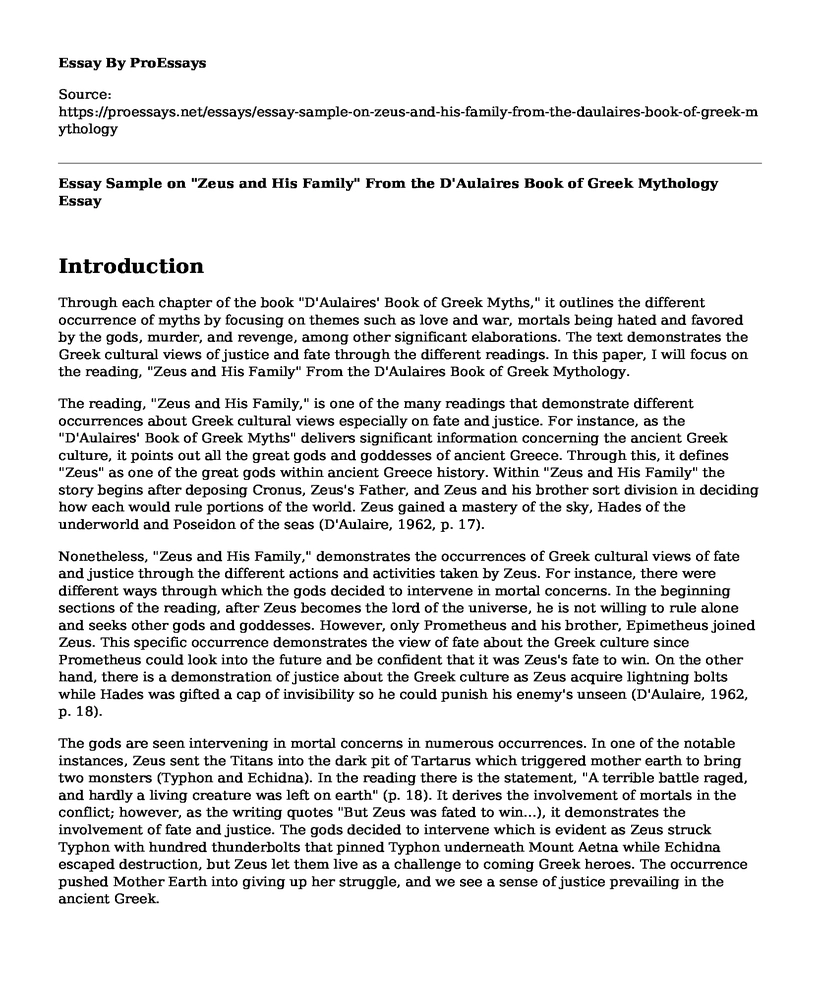Introduction
Through each chapter of the book "D'Aulaires' Book of Greek Myths," it outlines the different occurrence of myths by focusing on themes such as love and war, mortals being hated and favored by the gods, murder, and revenge, among other significant elaborations. The text demonstrates the Greek cultural views of justice and fate through the different readings. In this paper, I will focus on the reading, "Zeus and His Family" From the D'Aulaires Book of Greek Mythology.
The reading, "Zeus and His Family," is one of the many readings that demonstrate different occurrences about Greek cultural views especially on fate and justice. For instance, as the "D'Aulaires' Book of Greek Myths" delivers significant information concerning the ancient Greek culture, it points out all the great gods and goddesses of ancient Greece. Through this, it defines "Zeus" as one of the great gods within ancient Greece history. Within "Zeus and His Family" the story begins after deposing Cronus, Zeus's Father, and Zeus and his brother sort division in deciding how each would rule portions of the world. Zeus gained a mastery of the sky, Hades of the underworld and Poseidon of the seas (D'Aulaire, 1962, p. 17).
Nonetheless, "Zeus and His Family," demonstrates the occurrences of Greek cultural views of fate and justice through the different actions and activities taken by Zeus. For instance, there were different ways through which the gods decided to intervene in mortal concerns. In the beginning sections of the reading, after Zeus becomes the lord of the universe, he is not willing to rule alone and seeks other gods and goddesses. However, only Prometheus and his brother, Epimetheus joined Zeus. This specific occurrence demonstrates the view of fate about the Greek culture since Prometheus could look into the future and be confident that it was Zeus's fate to win. On the other hand, there is a demonstration of justice about the Greek culture as Zeus acquire lightning bolts while Hades was gifted a cap of invisibility so he could punish his enemy's unseen (D'Aulaire, 1962, p. 18).
The gods are seen intervening in mortal concerns in numerous occurrences. In one of the notable instances, Zeus sent the Titans into the dark pit of Tartarus which triggered mother earth to bring two monsters (Typhon and Echidna). In the reading there is the statement, "A terrible battle raged, and hardly a living creature was left on earth" (p. 18). It derives the involvement of mortals in the conflict; however, as the writing quotes "But Zeus was fated to win...), it demonstrates the involvement of fate and justice. The gods decided to intervene which is evident as Zeus struck Typhon with hundred thunderbolts that pinned Typhon underneath Mount Aetna while Echidna escaped destruction, but Zeus let them live as a challenge to coming Greek heroes. The occurrence pushed Mother Earth into giving up her struggle, and we see a sense of justice prevailing in the ancient Greek.
Conclusion
To sum everything up, the reading "Zeus and His Family" demonstrates that the Greek cultural views of fate and justice are tied between various actions by the gods. A comprehensive example is the involvement of the gods and deciding to intervene in mortal concerns. According to the book, in case there were violent quarrels, Zeus would reach for a thunderbolt and Olympians would retract to order since Zeus was stronger than all the other goods altogether. Also, the reading demonstrates the Greek cultural view of justice and fate, and it settles on the significance of fate in delivering justice (Schomp, 2007).
References
D'Aulaire, I. M. (1962). D'Aulaires book of Greek myths. Doubleday.
Schomp, V. (2007). The Ancient Greeks. Marshall Cavendish.
Cite this page
Essay Sample on "Zeus and His Family" From the D'Aulaires Book of Greek Mythology. (2022, Nov 08). Retrieved from https://proessays.net/essays/essay-sample-on-zeus-and-his-family-from-the-daulaires-book-of-greek-mythology
If you are the original author of this essay and no longer wish to have it published on the ProEssays website, please click below to request its removal:
- Literary Essay Example: Review of Adventures of Huckleberry Finn by Mark Twain
- In Cold Blood by Truman Capote - Literary Paper Example
- The Nature of Heroism in Literature Essay
- Crucible as an Allegory Essay
- Poetry Analysis Essay on poems "Unearth", "Eyes" and "Key"
- Literary Analysis Essay on The Valley of Ashes Symbolism in The Great Gatsby
- Shirley Jackson's The Lottery Essay Example







